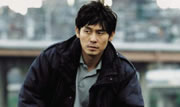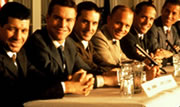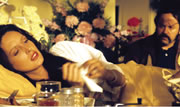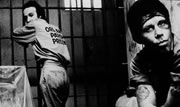
What's your favorite film? Is there a movie that changed your life? Send us an essay of 500 words or less about that film you can't forget – classic or contemporary – and we'll consider it for publication in these pages. In addition to your short essay, send your name, occupation, hometown, phone number, jpeg headshot and e-mail address to Editor@AFI.com. We reserve the right to edit for length and clarity.
READER REVIEW: RUMBLE FISH
By Hans Morgenstern
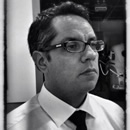
Hans Morgenstern, Miami freelance writer and film critic, is a member of the Florida Film Critics Circle for his work on indieethos.wordpress. com.
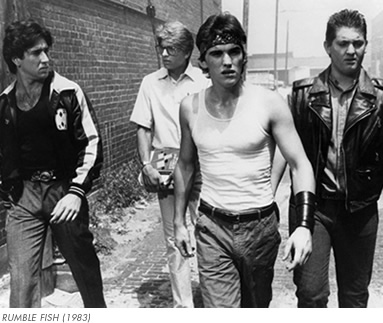 While other film lovers rack their brains and constantly update their lists, one film will forever remain on the top of this cinephile's list as a favorite: Francis Ford Coppola's 1983 movie RUMBLE FISH. Beyond the atmospheric black and white cinematography, including gorgeous time lapse interludes of rapidly swelling and dissipating clouds, not to mention blistering performances by Matt Dillon, Mickey Rourke and Diane Lane, unique circumstances outside the film raise RUMBLE FISH to a level of personal importance. Ultimately, film is the relationship between the images and the viewer, and this film earned a place in this writer's heart like no other has or ever will.
While other film lovers rack their brains and constantly update their lists, one film will forever remain on the top of this cinephile's list as a favorite: Francis Ford Coppola's 1983 movie RUMBLE FISH. Beyond the atmospheric black and white cinematography, including gorgeous time lapse interludes of rapidly swelling and dissipating clouds, not to mention blistering performances by Matt Dillon, Mickey Rourke and Diane Lane, unique circumstances outside the film raise RUMBLE FISH to a level of personal importance. Ultimately, film is the relationship between the images and the viewer, and this film earned a place in this writer's heart like no other has or ever will.
It began during my exploration of the musical solo projects of members of The Police. When I heard drummer Stewart Copeland's score to RUMBLE FISH on cassette as a 13-year-old boy, it swept me away into a vivid world of atmosphere that stretched deeper than any other music I had ever encountered. The music had a nocturnal quality with its echoing guitars and ever-chattering percussion, from marimbas to cymbals. Beyond some droning synthesizers providing an ethereal hum below many of the active instruments, Copeland also included rumbling motorcycle engines, distant train horns and typewriters as percussion. This was vivid music, and it was all I had, as I could only imagine the actual images that accompanied the soundtrack.
About five years later, when I finally caught the film on TV, I was awed. I had no idea the movie featured such brilliant, yet relatable stylization. Working with a vibrant story of youth in turmoil by S.E. Hinton, scene after scene, the film never letdown. From the surreal performances and set pieces that sometimes mysteriously became bathed in smoke and the ever-inventive camera angles, this was cinema taking the notion of dream factory to heart. CITIZEN KANE had nothing on this. Coppola clearly borrowed the mise-en-scene and the surprising camera positions, but made it his own.
Lane was the most beautiful woman I had ever seen in a movie. Her character had an ethereal indifference that also revealed a sensible young woman with subdued affection for the misguided hero Rusty James played with dopey faux cool by Dillon. Rourke exuded a disconnected charm as his enigmatic older brother and a creature in tune with another level of existence that some characters wrote off as madness. This was more than a depiction of teens caught in existential crisis, these were soulful beings caught in a hard world ready to chew them up.
My dream had been to catch the film on 35mm in a movie theater, and it came true during the 2002 Miami International Film Festival. Many times during the screening I could hardly believe I was watching RUMBLE FISH in a theater. With those surreal interludes of rolling gray clouds filling the screening in luminous 35mm, I felt I was in a dream within a dream within a dream. Call it sentimental, but my adoration for the film and all the serendipitous elements of my life associated with it will forever make RUMBLE FISH my favorite movie of all time.
READER REVIEW: 12 ANGRY MEN
By Tom Holliday

Tom Holliday is a Corporate Communications professional in Columbus, Ohio, a member of Actors’ Equity Association’s Equity Membership Candidate program and a major film buff.
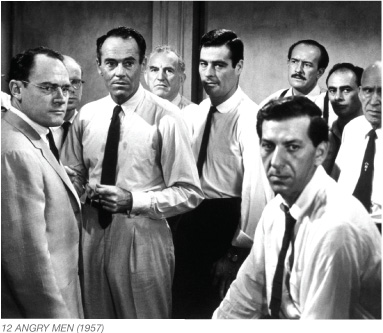 I remember it was a lazy, rainy Saturday afternoon in 1965 or 1966 when I first saw the movie that would change the way I'd look at movies forever. I was probably 10 or 11 years old and I was upset that the weather was preventing me from playing with my friends. So, I decided to turn on the TV and do a little channel surfing (if you can call clicking through three channels "surfing.")
I remember it was a lazy, rainy Saturday afternoon in 1965 or 1966 when I first saw the movie that would change the way I'd look at movies forever. I was probably 10 or 11 years old and I was upset that the weather was preventing me from playing with my friends. So, I decided to turn on the TV and do a little channel surfing (if you can call clicking through three channels "surfing.")
I was already a major movie fan, even though I rarely got to see a first-run film. My parents were of modest means and movies were seen as an extravagance that might be enjoyed once a year, perhaps to celebrate a major holiday. But thanks to television, I was able to see a wide array of classic movies on the afternoon and late evening programs that local network affiliates tended to schedule at that time.
And that's how I happened upon Sidney Lumet's classic version of 12 ANGRY MEN on that rainy Saturday afternoon. Mind you, I would have much preferred to stumble across a Martin and Lewis comedy. But it didn't take long for me to become completely 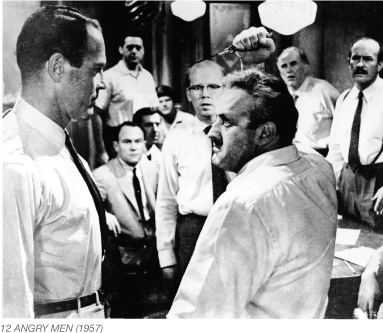 absorbed by the mood and atmosphere of the movie. From the moment I watched the close-up of the accused dissolve into the wide shot of the jury room behind the sound of the haunting simple score by Kenyon Hopkins, I was completely hooked. I was completely involved and needed to know where this was going. I somehow knew at that point that this was not "just another movie." I knew this movie was going to be important to me. And it was.
absorbed by the mood and atmosphere of the movie. From the moment I watched the close-up of the accused dissolve into the wide shot of the jury room behind the sound of the haunting simple score by Kenyon Hopkins, I was completely hooked. I was completely involved and needed to know where this was going. I somehow knew at that point that this was not "just another movie." I knew this movie was going to be important to me. And it was.
12 ANGRY MEN was significant to me in three ways. First and foremost, it was the first movie I'd ever seen that addressed a controversial issue – the destructive nature of bigotry, racism and hate. This was pretty heady stuff to a pre-teen who'd grown up in a fairly protected Midwestern world of suburbs and parochial schools. It undoubtedly had an influence on the way I would approach and think about those issues in the years and decades ahead.
Second, the film showed me that movies could do more than entertain. In the right hands, movies could be a powerful force to educate, inform and inspire.
And lastly, 12 ANGRY MEN was the first film that allowed me to truly appreciate how the elements of filmmaking – acting, directing, music, set design, editing, cinematography – all contribute to the creation of an experience for the viewer that leaves a lasting impression. I could feel how hot it was in that room. I could smell the mixture of smoke, sweat and anxiety filling the room. I felt like I was eavesdropping on an adult conversation that I wasn't supposed to hear. But it was critical that I hear it.
Now, nearly 40 years after seeing it for the first time, I'm still affected by it. And I'll watch it from start to finish whenever I stumble on it while clicking through my 500 cable channels on a rainy Saturday afternoon.
Edit Here

